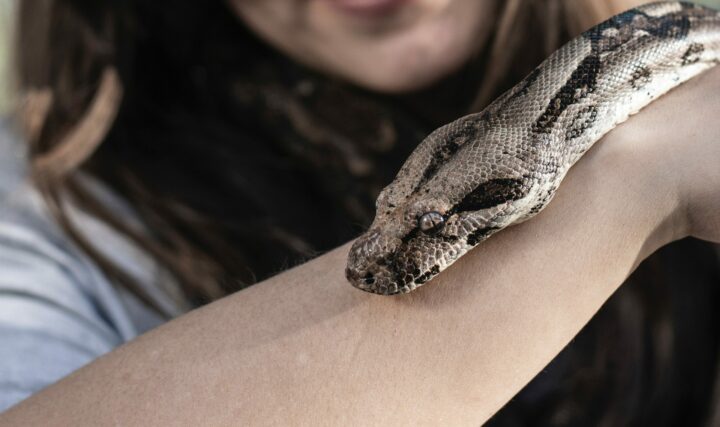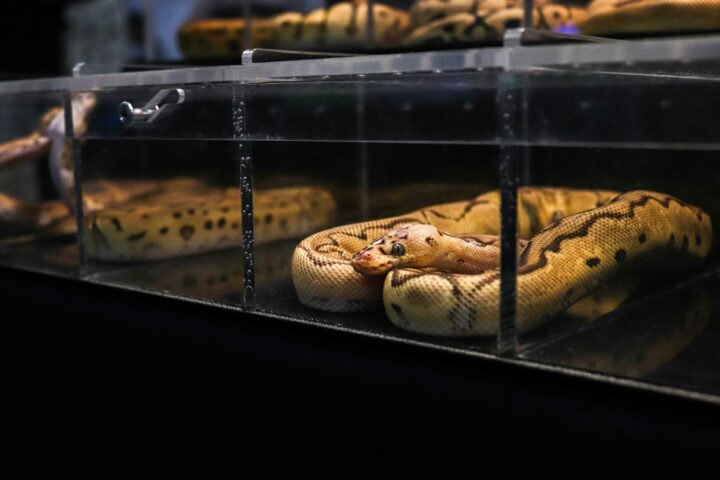Embarking on the journey of bringing a reptile into your home is an exciting endeavor. However, ensuring that you choose a reputable reptile breeder or source is crucial to the well-being and happiness of your scaly companion.
In this guide, we will unravel the mysteries and complexities of finding a trustworthy reptile breeder, equipping you with the knowledge to make informed decisions and establish a strong foundation for a lifelong relationship with your reptilian friend.
What qualities define a reputable reptile breeder?
A reputable reptile breeder possesses several key qualities that set them apart. Firstly, they prioritize the welfare and well-being of their reptiles, ensuring proper nutrition, habitat, and healthcare.
They maintain clean and spacious facilities that mimic natural environments. Additionally, they demonstrate deep knowledge and expertise about the species they breed, offering valuable guidance and support to prospective owners.
A reputable breeder also exhibits transparency, willingly sharing information about their breeding practices, lineage, and genetic history. They genuinely care about the long-term success and happiness of the reptiles they produce, making them an ideal choice for responsible reptile enthusiasts.
Where can I find reliable recommendations for reptile breeders?
Finding reliable recommendations for reptile breeders can be a valuable starting point. One excellent resource is online reptile forums and communities where experienced reptile owners discuss their experiences and recommend reputable breeders.
Reaching out to local herpetological societies, reptile clubs, or exotic pet associations can also provide valuable insights and recommendations. Attending reptile expos and shows allows you to interact directly with breeders, ask questions, and assess their credibility.
Lastly, seeking recommendations from trusted reptile veterinarians or knowledgeable reptile enthusiasts in your area can help you find reputable breeders with a proven track record.
Are there any red flags to watch out for when evaluating a reptile breeder?

While searching for a reputable reptile breeder, it’s important to be aware of potential red flags. Breeders who exhibit poor communication or reluctance to answer questions about their practices and the health of their reptiles should be approached with caution.
Unwillingness to allow visits to their facilities or lack of transparency regarding their breeding methods are additional warning signs. Reputable breeders prioritize the welfare of their reptiles and will willingly provide information and allow you to observe their operations.
Trust your instincts and be wary of any breeder who raises concerns or fails to meet your expectations in terms of professionalism and transparency.
How important is a breeder’s experience and expertise?
A breeder’s experience and expertise are crucial factors to consider when selecting a reptile breeder. Experienced breeders possess a deep understanding of the species they work with, including their unique requirements, behaviors, and genetics.
Their expertise allows them to make informed decisions regarding breeding pair selection, optimal husbandry practices, and ensuring the overall health of their reptiles.
They are better equipped to address potential challenges that may arise during the breeding process and can offer valuable guidance and support to new reptile owners. Opting for an experienced breeder increases the likelihood of obtaining a healthy and well-cared-for reptile.
What role does the breeder’s reputation play in the selection process?
The breeder’s reputation plays a significant role in the selection process and serves as a valuable indicator of their credibility. A reputable breeder earns their positive reputation through consistently producing healthy, high-quality reptiles and providing exceptional customer service.
Positive reviews and recommendations from previous customers are a testament to their professionalism and the overall satisfaction of their clientele. Conversely, a breeder with a poor reputation, negative reviews, or a history of complaints should raise concerns.
Researching the breeder’s reputation and considering feedback from others helps you make an informed decision and choose a breeder with a proven track record of excellence.
What steps can I take to ensure the health and quality of the reptiles they breed?
Ensuring the health and quality of the reptiles bred by a breeder requires taking certain proactive steps. Firstly, inquire about the breeder’s husbandry practices, including the nutrition, environmental conditions, and veterinary care provided to their reptiles.
Ask about any health guarantees or warranties they offer. Request information about the lineage and genetic history of the reptiles, ensuring that the breeder maintains meticulous records. When possible, visit the breeder’s facility in person to assess the cleanliness, organization, and overall condition of the reptiles.
Additionally, asking for references from other reptile owners who have purchased from the breeder can provide valuable insights into the health and quality of their reptiles.
Are there specific certifications or affiliations that indicate a breeder’s credibility?

Certain certifications and affiliations can indeed indicate a breeder’s credibility and commitment to responsible breeding practices. One prominent certification is the Reptile Breeder’s License, which demonstrates compliance with ethical and legal standards for reptile breeding.
Membership in respected herpetological societies, such as the Association of Reptilian and Amphibian Breeders (ARAB) or the International Herpetological Breeders and Keepers Association (IHBKA), signifies a breeder’s dedication to education, conservation, and the welfare of reptiles.
While certifications and affiliations alone do not guarantee a breeder’s credibility, they serve as additional indicators of their commitment to professionalism and responsible breeding practices.
What kind of housing and care facilities should I expect from a reputable breeder?
A reputable breeder should maintain housing and care facilities that prioritize the well-being and comfort of their reptiles. Cleanliness is essential, with enclosures regularly sanitized to prevent the spread of disease.
Reptile habitats should be appropriately sized, providing ample space for natural movement and enrichment. Adequate temperature and humidity regulation are crucial for the health and thriving of the reptiles.
The breeder should also demonstrate a commitment to environmental enrichment, offering hiding spots, appropriate substrate, and species-specific accessories. By ensuring that their housing and care facilities meet these standards, a reputable breeder demonstrates their dedication to maintaining the highest quality of life for their reptiles.
How transparent should a breeder be about the lineage and genetics of their reptiles?
Transparency regarding the lineage and genetics of reptiles is an essential aspect of a reputable breeder’s practices. A trustworthy breeder should readily provide accurate and detailed information about the lineage, including the names of the parents and any relevant genetic traits.
They should be able to explain the genetic background and any potential health concerns associated with the specific bloodlines. By being transparent about the lineage and genetics, breeders empower prospective owners to make informed decisions, understand potential genetic risks, and have a clear understanding of the reptile’s heritage.
Are there any testimonials or reviews from previous customers that I can rely on?
Testimonials and reviews from previous customers can be valuable resources when evaluating a reptile breeder. Reputable breeders often have satisfied customers who are eager to share their positive experiences. These testimonials provide insights into the breeder’s professionalism, the quality of their reptiles, and the overall satisfaction of their customers.
Look for reviews that highlight the breeder’s honesty, responsiveness, and ongoing support. However, it’s important to approach testimonials with discernment, considering both positive and negative feedback to form a well-rounded impression of the breeder’s reputation and reliability.
Do reputable breeders offer ongoing support and guidance after the purchase?
Reputable breeders understand that the journey doesn’t end with the purchase of a reptile; it is just the beginning. They take pride in offering ongoing support and guidance to their customers. Whether it’s providing care sheets, offering advice on proper husbandry practices, or addressing any concerns or questions that may arise, reputable breeders are committed to ensuring the well-being of the reptiles they sell.
They are a valuable resource for new owners, offering guidance on feeding, habitat setup, health maintenance, and any other aspect of reptile care. By providing ongoing support, reputable breeders demonstrate their dedication to the long-term success and happiness of their reptiles and customers.
What are the benefits of visiting the breeder’s facility in person?
Visiting the breeder’s facility in person offers several benefits when selecting a reputable breeder. It allows you to personally assess the conditions in which the reptiles are bred and raised. You can observe the cleanliness, organization, and overall health of the facility, gaining insights into the breeder’s commitment to proper husbandry practices.
Interacting with the reptiles gives you an opportunity to assess their temperament, activity levels, and overall well-being. Moreover, visiting the breeder in person enables you to ask questions, discuss specific concerns, and establish a personal connection. It provides a comprehensive and firsthand understanding of the breeder’s operation, ensuring confidence in your choice and fostering a trusting relationship.
Should I consider adopting from a reptile rescue or sanctuary instead of a breeder?
Adopting from a reptile rescue or sanctuary can be a compassionate and fulfilling choice for acquiring a reptile companion. Rescues and sanctuaries provide a second chance for reptiles in need and often have a wide variety of species available for adoption. By adopting, you contribute to the welfare and conservation of reptiles, offering a loving home to those that have been abandoned, surrendered, or rescued.
Reptile rescues and sanctuaries typically ensure the health and well-being of the reptiles in their care, conduct proper assessments and provide necessary medical treatments. Choosing adoption from a reputable rescue or sanctuary allows you to make a positive impact and provide a forever home to a reptile in need.
Are there any legal requirements or permits associated with reptile breeding?

Reptile breeding may be subject to specific legal requirements and permits, depending on your jurisdiction and the species you intend to breed. It is essential to research and comply with the laws and regulations governing reptile breeding in your area. Some species may require permits or licenses to breed and sell, particularly if they are considered endangered or protected.
Breeding without proper permits can lead to legal consequences and may contribute to the illegal wildlife trade. By understanding and adhering to the legal requirements associated with reptile breeding, you demonstrate your commitment to ethical practices and contribute to the conservation and protection of reptiles.
How can I ensure the breeder practices ethical and responsible breeding methods?
| Factors | Reputable Breeder | Non-Reputable Breeder |
|---|---|---|
| Transparency | Open about lineage, genetics, and breeding practices | Lacks transparency, avoids sharing information |
| Customer Feedback | Positive testimonials and reviews from satisfied customers | Negative or limited customer feedback |
| Ongoing Support | Provides guidance and assistance post-purchase | Lacks support and guidance after the sale |
| Facility Visit | Welcomes visits, maintains clean and organized facilities | Discourages or denies facility visits |
| Ethical Practices | Follows responsible breeding methods, prioritizes reptile welfare | Engages in unethical practices, neglects reptile well-being |
Ensuring that a breeder practices ethical and responsible breeding methods is of utmost importance. One way to assess this is by inquiring about the breeder’s breeding philosophy and practices. Ethical breeders prioritize the welfare of their reptiles, including proper nutrition, habitat conditions, and healthcare.
They engage in responsible pairings, considering genetic diversity and avoiding harmful inbreeding practices. Transparency about the breeding process, including the documentation of lineage and genetic information, is a hallmark of ethical breeders.
Additionally, reputable breeders participate in educational initiatives, conservation efforts, and relevant professional organizations. Conducting thorough research, seeking recommendations, and visiting the breeder’s facility in person allow you to assess their commitment to ethical and responsible breeding methods.
End notes
In conclusion, choosing a reputable reptile breeder or source is crucial to ensure the health, well-being, and quality of the reptile you bring into your home. By considering qualities such as transparency, experience, reputation, and the breeder’s commitment to ethical practices, you can make an informed decision.
Seek recommendations, read testimonials, and visit the breeder’s facility whenever possible to assess their credibility firsthand. Remember to adhere to legal requirements and consider adoption from reptile rescues or sanctuaries as a compassionate alternative.
By taking these steps, you can find a reputable breeder who will provide ongoing support and guidance, ultimately enhancing your reptile ownership experience.




